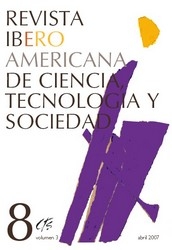Ciência e Política
Perspectiva Histórica e Modelos Alternativos
DOI:
https://doi.org/10.52712/issn.1850-0013-950Palavras-chave:
política científica, ética, orçamento científico, modelos alternativosResumo
É legítimo que as questões éticas façam uso de meios políticos para influenciar a direção da pesquisa científica? Até que ponto seria possível ou desejável permitir que a competição política e econômica influenciasse a trajetória da pesquisa científica? Essas perguntas orientam a avaliação crítica das relações entre ciência e política realizada pelos autores. Para desenvolver essa análise, eles oferecem uma abordagem dos antecedentes históricos da política científica, apresentam dados comparativos e reflexões éticas sobre a política orçamentária da ciência e, por fim, explicam o alcance de modelos alternativos de políticas científicas.
Downloads
Referências
BUSH, Vannevar (1945): Science. The Endless Frontier, Washington, DC, U.S. Government Printing Office.
FARMER, Paul (2003): Pathologies of Power: Health, Human Rights, and the New War on the Poor, Berkeley, CA, University of California Press.
GREENBERG, Daniel S. (2001): Science, Money, and Politics: Political Triumph and Ethical Erosion, Chicago, University of Chicago Press.
LONGINO, Helen (1990): Science as Social Knowledge: Values and Objectivity in Scientific Inquiry, Princeton, NJ, Princeton University Press.
POLANYI, Michael (1962): “The Republic of Science: Its Political and Economic Theory,” Minerva, vol. 1, no. 1, pp. 54-74.
RAWLS, John (1971): A Theory of Justice, Cambridge, MA, Harvard University Press.
SAREWITZ, Daniel (2003): “Does Science Policy Exist, and If So, Does it Matter?Some Observations on the U.S. R&D Budget.” Discussion Paper for Earth Institute (Columbia University) Science, Technology, and Global Development Seminar, April 8.
SAREWITZ, Daniel (1996): Frontiers of Illusion: Science, Technology, and the Politics of Progress, Philadelphia, Temple University Press.
Downloads
Publicado
Como Citar
Edição
Seção
Licença
Copyright (c) 2025 CC Attribution 4.0

Este trabalho está licenciado sob uma licença Creative Commons Attribution 4.0 International License.
Todas os números de CTS e seus artigos individuais estão sob uma licença CC-BY.
Desde 2007, a CTS proporciona acesso livre, aberto e gratuito a todos seus conteúdos, incluídos o arquivo completo da edição quadrimestral e os diversos produtos apresentados na plataforma eletrônica. Esta decisão é baseada no entendimento de que fornecer acesso livre aos materiais publicados ajuda a ter uma maior e melhor troca de conhecimentos.
Por sua vez, em se tratando da edição quadrimestral, a revista permite aos repositórios institucionais e temáticos, bem como aos sites pessoais, o autoarquivo dos artigos na versão post-print ou versão editorial, logo após da publicação da versão definitiva de cada número e sob a condição de incorporar ao autoarquivo um link direcionado à fonte original.











